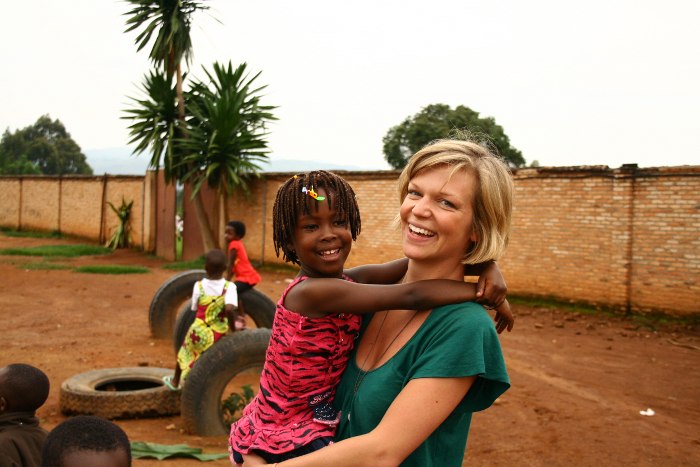« I›ll spend my holidays in Burundi. “Where?” – “Burundi?”Ah. In which country is that again? “It’s sad because in Germany many people have never heard about Burundi. So, how do you describe it? – By Luisa Wawrzinek

Luisa Wawrzinek with Burundian kids ©Iwacu
Burundi is a country, where, “today” literally means the same thing as “tomorrow”, where people face problems with a distinct sense of improvisation, where the way between two points usually is not a straight line, where laughing is not an exception, but normality. Where you can experience a power cut at the airport five minutes before your plane is supposed to leave, where you see someone’s chicken with leashes in the street, where even small children already can dance as if they have never done anything else.
I have been to Burundi three times – visiting my parents and my sister, who are currently living there. After I step out of the plane in Bujumbura, I usually experience the happiest weeks of the year. Of course, being on holidays and having an overdose of sun helps a lot. But it is not as simple as that: Burundi evokes very strong emotions. It amazed me as well as it unsettled me.
The landscape is the capital: but still an insider’s tip
I am sitting inside the car of my parents quite often, driving around the hills. Whenever I look outside the car, I find a surprise around the next corner. My amazement doesn’t come from specific sightseeing – it is simply caused by the landscape. Burundi has green hills, high mountains, and sandy beaches. It is still pure, not destroyed by industry, and green as a forest can be. Nevertheless, Burundi is not using this capital to its fullest: there is no real touristic infrastructure. In Bujumbura, you can sleep and eat well, but once you start your travel towards villages, you feel lost as a foreigner very easily – if you are not a true adventurer. You want to visit the Nile Source or Kagera Falls? People without local friends simply don’t know how to reach these spots. If it were easier to get from A to B and if more people could know about the country, you would probably be flooded by Europeans, packed with tents, hiking shoes and cereal bars. It is another question if that is desirable. But for sure it would bring more money into the country.
Even if you barely have anything, it is still enough to share it with someone
The other power of the country is the people. Everyone is soaked with happiness and humor – you love to laugh, chat and sing. They welcomed me with open arms – and already my little effort to form basic Kirundi sentences gave me a lot of shining smiles (even though I still stumble across a jungle of vocals and endless words). Like in most African countries, you share a lot. I experienced it in daily life: while I was sitting in a Memento-Bus, we passed by Gitega. Two women behind me needed a bunch of bananas and some bread – and immediately a man in the front started to negotiate lively in order to get the best price for the women. Probably you will think: “Of course, that’s how we do it. So what?” But compared to Germany, this culture of sharing, helping and participating within the life of others is different. In Germany, life is much more anonymous, and the borders between “mine” and “yours” are much stronger than in Burundi. For me, this experience was exhilarating.
Music is connecting people
My favorite moment in Burundi was on a field in Ruyigi. The sun was slowly vanishing, we were sitting in the grass, and some cows were grazing a few meters away. A little girl was playing with my hair; some boys were standing beside us, laughing. We were watching the “Tambourinaires”(drummers) – not the “real” ones, but a young group that has to take some extra lessons twice a week – because they don’t master yet how to use the sticks while beating the drums … sometimes, there was a beat too much, a jump in the wrong direction – but for us, it was a joy. I could feel the strong beat and watched the children dancing. This moment was so normal, it was not important being Bazungu or Barundi, it was all about the beat of Burundi – and nothing more.
“Buhorobuhoro” – things won’t continue until tomorrow
In Burundi, time has a different meaning than in Germany. Surprisingly, in some behavior patterns I got the feeling that Burundians live as if there were no tomorrow – and in some case, as if their contingent of time were endless. On one side, sustainability is not considered as a virtue. That is understandable when people grow up in precarious circumstances and have to struggle to survive the next day. On the other side, “there’s always time until tomorrow”. Once you understand that as a foreigner, you can react to it – still, “buhorobuhoro” is a word that I heard quite often. Since language is a good indicator as a mentality – I had to laugh when I found out that “ejo” means “yesterday” and “tomorrow” at the same time.
Does a history of shadows create feelings of apathy?
One situation confused me. When I visited Burundi last year, the Bujumbura Central Market had caught fire two weeks before. A Burundian woman was selling fruit there some years ago – therefore, she knew some sellers who lost everything during the fire. She told this as if it were another story, shrugged her shoulders and continued working. I couldn’t understand it – for me, talking about tragedies evokes emotions. The woman didn’t show any pain, and I am still wondering myself whether this is only a wrong impression or if blunting emotion is a logical result after having experienced war. And not that the war would already have been enough; the population is cautiously distressed by new strokes of fate. Even though “fate” probably is the wrong word, because it refers to the development of events outside a person’s control – and that would mean that some events were not caused by specific people.
A new civil society is collecting power
It’s impossible to say who or what is responsible for poverty. Everyone has a different answer to that question: colonization, corrupt politicians, wrong economic strategies, laziness, lacking visions, foreign aid… What it is, we cannot say. The only thing we can say: once a country is poor, it is very hard for it to activate its own power enough to come out of it. Therefore, it is a blessing when I see people achieving goals with their own power. When I visited the Bujumbura Central Market again this time, I was happy to see the front corner full of fruit and vegetables. Wow, what a challenge! I have a huge respect for all the sellers that try to build up a new business again, after everything was knocked down within hours. The majority, and especially women, already has to work a lot in general. Fighting for space and showing protest in the street need even more strength. I really admire that – especially since organizing and participating in demonstrations is not an easy step in this country.
An impressive woman with an expressive message

Burundian Children playing ©Iwacu
Burundi has a lot of courageous people. And there is one woman that impressed me the most: Maggy Barankitse. That woman is already a phenomenon, when she enters the room: loudly laughing, telling jokes about her (partly very tragic) history, mixing five languages in one sentence. But of course, the most impressive about her is that she created a great project out of a big pile of shards: Maison Shalom. Maggy wants to teach the new generation that tolerance is not a question of ethnicity – that is important in a country, it is history. I spent some time at Maison Shalom, because my sister is working there at the moment. For me, it was a great experience – it started in the morning when travelling in a completely overloaded school bus, full of children screaming and singing. It went on with giving some small lessons at school, trying to find a communication somewhere between French, English and Kirundi. During the lunch break, I was surrounded by kids playing – in the afternoon, we spent time with the orphans that live in Maison Shalom. Those children are so full of joy and energy, even though I was exhausted by playing with them for hours; they filled me up with new energy and a new way of thinking.
In general, I learned a lot during my visit in Burundi – and I cannot wait to come back again. Burundi is an impressive country with a big potential – hopefully it is able to use it to its fullest soon.



















 IWACU Open Data
IWACU Open Data

